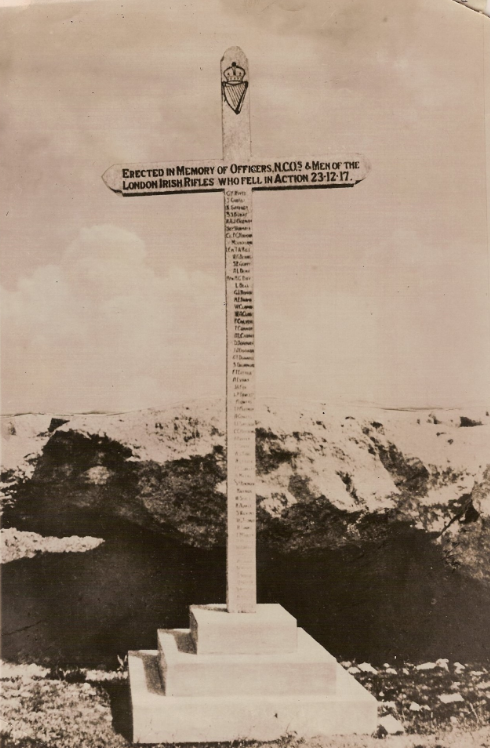In the course of five weeks, the battalion had passed from the great heat and water scarcity of the desert to days and nights of continuous rain and it had now become bitterly cold. The area north of Jerusalem was a nightmare of rocky hills and no frontline was obvious. Some of the high points were held by the Turks, others not. One of the highest hills, midway between each Army’s position and thought to contain an enemy observation post, was one called Kherbet Adasseh.
On 18th December, a failed attempt had been made by the battalion to take Kherbet Adasseh before, on the night of 22nd/23rd December, the 2/18th Battalion was again ordered to take and hold the position
The following hours were a tale of almost complete disaster for the battalion. Only one out of 14 officers would return and the battalion strength of nearly 700 would be reduced to 130. According to the CWGC, 54 London Irishmen, killed on 23rd December 1917, are buried or named in Memorial at their cemetery in Jerusalem. It was a truly catastrophic day for the battalion and a wooden Memorial Cross would be erected by the Battalion Pioneer Sergeant on the exact spot of the disaster.

One of those killed at Kherbet Adasseh was Lt Whyte MC. In his last letter home to his wife Ethel in London on 18th December, he had written in a typically understated soldierly manner: “These last days have been pretty strenuous, and now that we are slack and more of less waiting for a few days, there is an inevitable reaction…”
It later emerged that two fresh Turkish divisions had recently arrived from Anatolia in preparation for an attempt to retake Jerusalem and it was these that the 2/18th Battalion had unexpectedly crashed into on the morning of 23rd December. A further unfortunate additional coda to the events at Kherbet Adasseh was that, when Battalion Chaplain Hickey helped to collect bodies a week later, he had noted that “practically every corpse had been stripped naked” and later it was found that some of Turkish dead were found “wearing uniforms and clothing taken from men of the London Irish.” A most regrettable outcome.